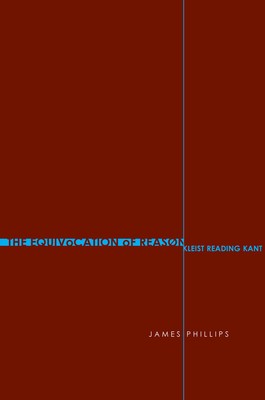
- We will send in 10–14 business days.
- Author: James Phillips
- Publisher: Stanford University Press
- ISBN-10: 0804755876
- ISBN-13: 9780804755870
- Format: 16.8 x 23.4 x 1.7 cm, kieti viršeliai
- Language: English
- SAVE -10% with code: EXTRA
Reviews
Description
The Equivocation of Reason: Kleist Reading Kant asks how the literary works of the German writer Heinrich von Kleist might be considered a critique and elaboration of Kantian philosophy. In 1801, the twenty-three-year-old Kleist, attributing his loss of confidence in our knowledge of the world to his reading of Kant, turned from science to literature. Kleist ignored Kant's apology of the sciences to focus on the philosopher's doctrine of the unknowability of things in themselves. From that point on, Kleist's writings relate confrontations with points of hermeneutic resistance. Truth is no longer that which the sciences establish; only the disappointment of every interpretation attests to the continued sway of truth. Though he adheres to Kant's definition of Reason as the faculty that addresses things in themselves, Kleist sees no need for its critique and discipline in the name of the reasonableness (prudence and common sense) of the experience of the natural sciences. Setting transcendental Reason at odds with empirical reasonableness, Kleist releases Kant's ethics and doctrine of the sublime from the moderating pull of their examples.
EXTRA 10 % discount with code: EXTRA
The promotion ends in 21d.22:03:26
The discount code is valid when purchasing from 10 €. Discounts do not stack.
- Author: James Phillips
- Publisher: Stanford University Press
- ISBN-10: 0804755876
- ISBN-13: 9780804755870
- Format: 16.8 x 23.4 x 1.7 cm, kieti viršeliai
- Language: English English
The Equivocation of Reason: Kleist Reading Kant asks how the literary works of the German writer Heinrich von Kleist might be considered a critique and elaboration of Kantian philosophy. In 1801, the twenty-three-year-old Kleist, attributing his loss of confidence in our knowledge of the world to his reading of Kant, turned from science to literature. Kleist ignored Kant's apology of the sciences to focus on the philosopher's doctrine of the unknowability of things in themselves. From that point on, Kleist's writings relate confrontations with points of hermeneutic resistance. Truth is no longer that which the sciences establish; only the disappointment of every interpretation attests to the continued sway of truth. Though he adheres to Kant's definition of Reason as the faculty that addresses things in themselves, Kleist sees no need for its critique and discipline in the name of the reasonableness (prudence and common sense) of the experience of the natural sciences. Setting transcendental Reason at odds with empirical reasonableness, Kleist releases Kant's ethics and doctrine of the sublime from the moderating pull of their examples.


Reviews